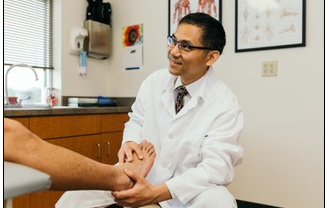Aging and Foot Health: Essential Tips for Comfort and Mobility By Dr. Phinit Phisitkul
Aging and Foot Health: Essential Tips for Comfort and Mobility By Dr. Phinit Phisitkul
Blog Article
Achilles tendonitis is an extremely common disorder that affects the Achilles tendon, which connects the muscles of the calf to the heel bone. For Dr. Phinit Phisitkul , identifying the reasons behind the condition, recognizing symptoms, and exploring effective treatments are essential for managing and regaining from Achilles tendonitis.

Causes of Achilles Tendonitis
Activities that involve repetitive stress to the Achilles tendon, such as jumping, running or sudden changes of direction, can lead to tendonitis. This is particularly common among athletes and individuals who suddenly increase the intensity or frequency of their physical activities.
Incorrectly fitting shoes or footwear that don't provide enough cushioning or support can lead to the formation the symptoms of Achilles tendonitis. Shoes that don't fit properly or provide insufficient shock absorption may place additional strain on the tendon.
Abnormalities in foot mechanics such as flat feet or high arches could affect the way that the Achilles tendon works, increasing the risk of tendonitis. Incorrect alignment or movements can be a contributing factor to the condition.
Symptoms of Achilles Tendonitis
Pain is often felt along the heel's back or in the tendon itself. It is usually caused by physical exercise or following periods of rest. The pain can begin with a minor ache that may gradually increase in intensity.
The Achilles tendon is a source of inflammation. It can result in swelling in the heel or in the tendon region. The swelling can be accompanied by warmth or redness. Lastly, stiffness in the tendon can limit the range of motion which can make walking and moving your feet difficult.
Best Treatment Approaches for Achilles Tendonitis
In the beginning, resting the feet and applying cold will aid in reducing pain and inflammation. Beware of activities that may aggravate symptoms is crucial for recovery. The over-the-counter medicines like ibuprofen can help manage the pain and decrease swelling.
A physical therapist can also give exercises to strengthen calf muscles and improve flexibility in the Achilles tendon. The stretching and strengthening exercises help alleviate symptoms and prevent future injuries.

Additionally, wearing shoes that have cushioning orthotic inserts may help to reduce strain and speed up healing. In the event that traditional treatments are not able to offer relief, medical procedures like corticosteroid injections or surgery might be suggested.For more details you should click on this kind of link Dr. Phinit Phisitkul Dakota Dunes, SD. Report this page